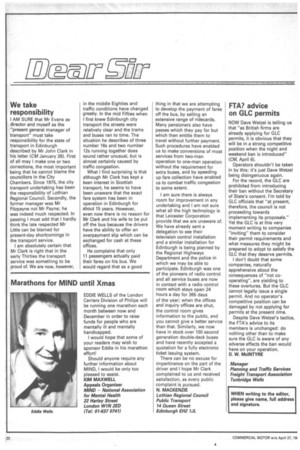We take responsibility
Page 24

If you've noticed an error in this article please click here to report it so we can fix it.
I AM SURE that Mr Evans as director and myself as the "present general manager of transport" must take responsibility for the state of transport in Edinburgh described by Mr John Clark in his letter (CM January 26). First of all may I make one or two corrections, the most important being that he cannot blame the councillors in the City Chambers. Since 1975, the city transport undertaking has been the responsibility of Lothian Regional Council. Secondly, the former manager was Mr Fitzpayne not Mr Payne; he was indeed much respected. In passing I must add that I hardly think the late respected Mr Little can be blamed for present-day shortcomings in the transport service.
I am absolutely certain that Mr Clark is right that in the early Thirties the transport service was something to be proud of. We are now, however, in the middle Eighties and traffic conditions have changed greatly. In the mid Fifties when first knew Edinburgh city transport the streets were relatively clear and the trams and buses ran to time. The situation he describes of three number 16s and two number 12s running together does sound rather unusual, but is almost certainly caused by traffic congestion.
What I find surprising is that although Mr Clark has kept a keen interest in Scottish transport, he seems to have been unaware that the exact fare system has been in operation in Edinburgh for about 15 years. However, even now there is no reason for Mr Clark and his wife to be put off the bus because the drivers have the ability to offer an overpayment slip which can be exchanged for cash at these offices.
He complains that only 11 passengers actually paid their fares on his bus. We would regard that as a good thing in that we are attempting to develop the payment of fares off the bus, by selling an extensive range of ridecards. Many pensioners also have passes which they pay for but which then entitle them to travel without further payment. Such procedures have enabled us to make conversions of most services from two-man operation to one-man operation without the requirement for extra buses, and by speeding up fare collection have enabled us to combat traffic congestion to some extent.
I am sure there is always room for improvement in any undertaking and I am not sure what all the high technology is that Leicester Corporation provide that we are unaware of. We have already sent a delegation to see their television control installation and a similar installation for Edinburgh is being planned by the Regional Highways Department and the police in which we may be able to participate. Edinburgh was one of the pioneers of radio control and all service buses are now in contact with a radio control room which stays open 24 hours a day for 365 days of the year; when the offices and inquiry offices are shut, the control room gives information to the public, and you cannot give a better service than that. Similarly, we now have in stock over 100 second generation double-deck buses and have recently accepted a quotation for a fully electronic ticket issuing system.
There can be no excuse for impertinence on the part of the driver and I hope Mr Clark complained to us and received satisfaction, as every public complaint is pursued.
N. MACKENZIE Lothian Regional Council Public Transport 14 Queen Street Edinburgh EH2 1JL




































































































